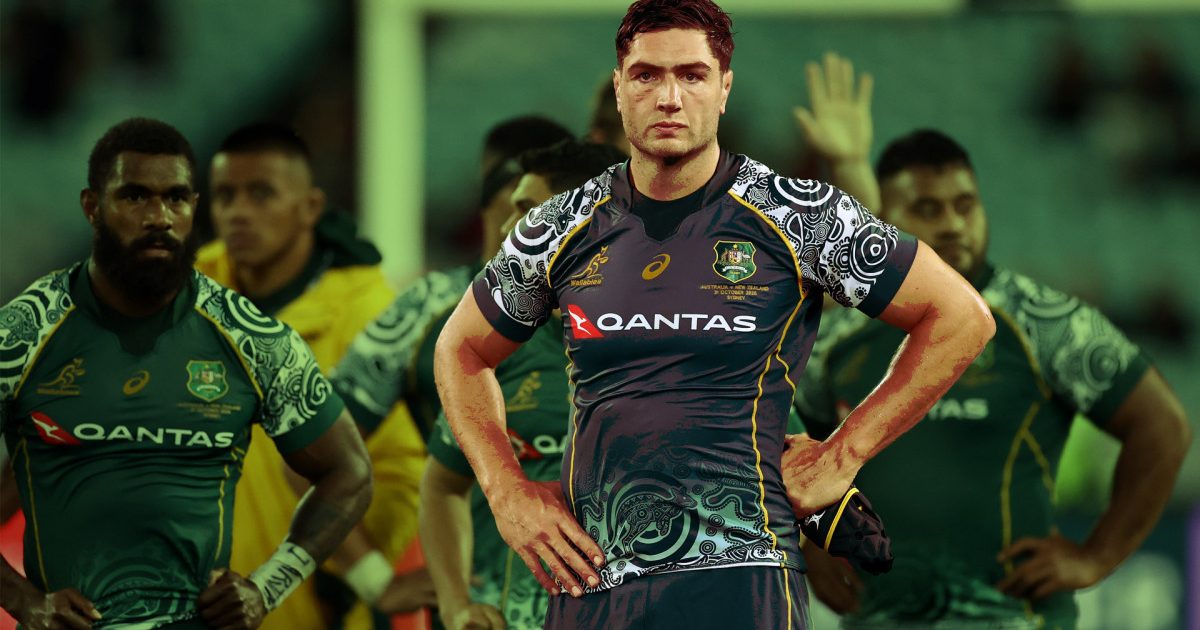The damning trend that could foreshadow a huge loss for the Wallabies in the final Bledisloe Cup test

As New Zealand fans were reminded during last year’s Rugby World Cup in Japan, the All Blacks sometimes lose.
Even the most consistent team in the world is not going to get it right every week and all it takes is an off night from the men in black – or a comparatively excellent performance from their opposition – for Kiwis to have to sit back and reflect on the fact that the All Blacks are not unstoppable.
Rarely, however, do the All Blacks lose two matches in a row. In fact, it’s only happened once in the last decade.
In 2011, with the World Cup on the horizon, head coach Graham Henry made the decision to send an understrength All Blacks side to South Africa for NZ’s third game of the Tri-Nations. The likes of Owen Franks, Brad Thorn, Richie McCaw, Kieran Read, Dan Carter, Ma’a Nonu, Conrad Smith, Cory Jane and Mils Muliaina – many of who started in the World Cup final months later – were all left at home for the All Blacks’ 18-5 loss. The following week, Australia also managed to upset New Zealand in Brisbane.
Since 2011, however, the All Blacks have never lost two matches on the trot – which is why the Wallabies’ hopes of snaring the Bledisloe Cup back after their loss in Auckland were slim to none.
It’s also why Dave Rennie’s introduction to test rugby was never going to go well, despite the coach’s immense promise.
With one more Bledisloe Cup match still to play before the Wallabies have the opportunity to tackle the relatively tame Pumas, things are only about to get tougher for the man that coached the Chiefs to back-to-back Super Rugby titles in 2012 and 2013.
There’s simply no bigger challenge in international rugby than kicking off your career with four games against the All Blacks and it’s a series of games that could have long term repercussions on Rennie and his young charges.
The Australian sides that have challenged New Zealand for the Bledisloe Cup over the last twenty years have all been talented, but with each defeat the players have become weighed down by history.
Man for man, the All Blacks have typically had stronger teams than their trans-Tasman rivals – but the gap has not been so big to justify the two decades of dominance by the Kiwis.
Instead, the repeated losses have built up an impossible mountain for Australia to climb. That mountain was significantly smaller at the beginning of this test season, when Rennie announced a squad populated by a slew of uncapped youngsters.
Many of Rennie’s 2020 debutants actually had winning records against national NZ sides until the Bledisloe Cup series kicked off – but those records have now been smashed to pieces, with a 0-3 ledger kicking off their international careers.
View this post on Instagram
New men such as Harry Wilson, Noah Lolesio and Filipo Daugunu could be long-term Wallabies – but few players take straight to test rugby and these young Super Rugby AU stars need time to bed themselves in. It’s hard to do that when you’re on the end of a few floggings – and things could get even worse this weekend.
The All Blacks haven’t played a four-match series since the game went professional and until recently, three-match series was also incredibly rare. In the last decade, however, New Zealand have hosted three-match series on six occasions, and there’s a clear trend in how the All Blacks have performed as the back-to-back-to-back games have progressed.
New Zealand tend to put in a respectable if not rusty performance in the first game, winning by an average of 17 points. Despite the players’ limited time together at that stage of the season, they are still relatively fresh compared to the Northern Hemisphere tourists, who are at the end of a long season.
After a few tweaks to combinations and tactics, the second match is often the closest of the series. Three times, against Ireland in 2012, England in 2014 and the British and Irish Lions in 2017, the visitors have kept the result with three points (or, in the Lions’ case, actually scored a win).
It’s in the third game, however, when the All Blacks tend to cut loose. They’ve spent plenty of time together in camp, they’ve worked out the flaws in their opposition’s game plan, and they’ve got their own tactics ticking along nicely.
In 2012, they beat the Irish 60-0 – despite the 3-point margin a week earlier. In 2016, they smashed Wales 40-0. Two years ago, they crushed France 49-14. The average scoreline in the third game of a three-match series with NZ is 41-11 in the All Blacks’ favour.
That’s exactly why the All Blacks’ 43-5 drubbing on Saturday night shouldn’t have come as a big surprise – and why next week’s game could be even more diabolical for the Wallabies. If the margin spike in the third game of a series reflects the All Blacks’ improvement over a string of games against the same opposition, then the Wallabies could find themselves on the wrong end of an absolute drubbing in Brisbane next weekend.
Had the Rugby Championship gone ahead as planned, before the Springboks pulled out of the competition, the Wallabies would have a brief respite ahead of them while the All Blacks would need to shift their focus to a new team. Instead, however, Australia find themselves poised for a fourth barrage – and things could be about to get ugly for the young, inexperienced team.











































































